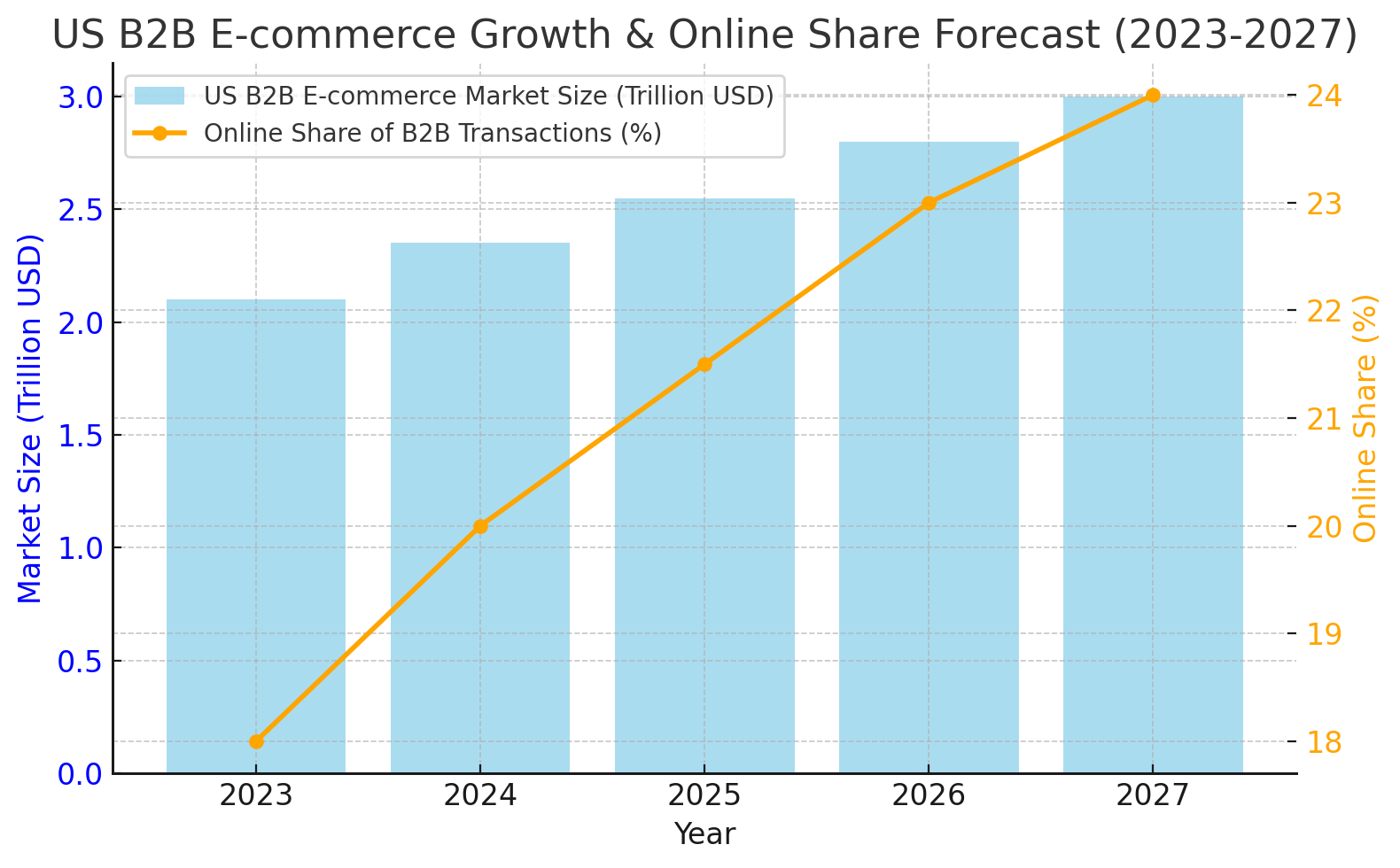

Salesforce B2B Commerce Cloud has emerged as a leading solution for enabling these experiences, but the value you get from the platform depends heavily on your choice of implementation partner. The right provider can ensure your commerce solution is deployed efficiently, integrated deeply into your business processes, and optimized for both current needs and future growth.
This guide will help you understand Salesforce Commerce Cloud for B2B, the types of implementation services available, and how to select the right partner for your business. We’ll also explore the role of offshore partners, the benefits of U.S.-based teams, and the importance of ongoing managed services, staff augmentation, and consultancy.
Salesforce B2B Commerce Cloud is designed specifically for complex business buying scenarios. Unlike traditional e-commerce platforms, it goes beyond product catalogs and shopping carts, offering capabilities that support contract pricing, account hierarchies, bulk ordering, and ERP integration, all within a secure, scalable environment.
Key features for B2B enterprises include:
These features collectively transform how B2B buyers interact with suppliers. Instead of relying solely on sales representatives for every transaction, customers gain the freedom to browse account-specific catalogs, place large orders, or reorder products instantly - while sales teams can focus on building strategic relationships. Integration with CRM and CPQ ensures that the customer experience is not just efficient but also deeply personalized and strategically aligned to each account.
Not all implementation services are created equal. Depending on your goals, you may need one, or a combination, of the following:
Each of these service types addresses different stages of the B2B commerce journey. Full-scale implementations lay the foundation, while integration services ensure operational harmony across systems.
Enhancement and optimization keep the platform competitive over time, managed services maintain operational stability, and training enables your workforce to leverage the platform’s full potential.
Selecting the right mix ensures your investment in B2B Commerce Cloud evolves in lockstep with your business.
Key criteria for selection:
The selection process should go beyond technical skills. A qualified partner should bring a consultative mindset; proactively identifying opportunities for business process improvements, anticipating future integration needs, and tailoring the platform to align with your growth trajectory. Their ability to think strategically, not just execute technically, will be a decisive factor in maximizing long-term ROI.
Offshore partners can offer:
These benefits can be compelling for cost-conscious B2B firms, but they require a mature project management structure to be realized effectively. Time zone differences can accelerate delivery cycles when well-managed, but without clear communication protocols and quality control, they can just as easily create delays. The decision to go offshore should factor in your internal team’s capacity to manage cross-border collaboration.
For U.S. B2B businesses, a domestic partner offers:
These advantages often translate to faster project alignment, fewer communication hurdles, and a deeper understanding of market nuances such as regional buying behavior, industry compliance standards, and the competitive landscape. For highly regulated or operationally complex industries, a U.S.-based partner can be an especially valuable ally.
FortéNext’s dual presence - combining a U.S.-based team with a global offshore delivery network, offers the best of both worlds for B2B companies. Clients benefit from local market expertise, same-time-zone collaboration, and face-to-face engagement with U.S. consultants, while also tapping into highly specialized offshore Salesforce talent.
This hybrid model means faster project timelines, continuous progress across time zones, and a blend of strategic insight with operational efficiency. For B2B companies, it’s a rare combination that balances deep industry understanding with the scalability and agility needed to compete, as B2B buyers increasingly demand D2C-like customer journeys.
A Salesforce implementation partner is a certified consulting firm or service provider that helps businesses deploy Salesforce solutions effectively. They bring technical expertise, industry knowledge, and project management skills to ensure the platform is set up, customized, and integrated with other business systems in a way that aligns with company goals. For B2B Commerce Cloud, the right partner ensures seamless ERP/CRM integration, personalized buyer journeys, and scalable commerce operations.
Implementation partners manage the end-to-end process of adopting Salesforce. This includes requirements gathering, solution design, configuration, integrations, testing, training, and post-launch support.
Beyond technical execution, strong partners also act as advisors, helping businesses adopt best practices, avoid pitfalls, and plan for growth. In the B2B Commerce Cloud context, they ensure your digital storefront meets complex business buying needs such as bulk ordering, contract pricing, and omnichannel fulfillment.
Salesforce classifies partners into tiers; Registered, Silver, Gold, Platinum, and Global Strategic, based on their expertise, certifications, and track record.
Higher-tier partners typically have broader industry experience, larger teams of certified experts, and more advanced capabilities for complex projects.
For B2B firms, the level of partner often reflects not just technical skills but also the ability to provide strategic guidance, long-term support, and global delivery models.
Costs vary significantly depending on project scope, partner location, and required services.
In addition to upfront costs, companies should budget for ongoing managed services, training, and optimization, which safeguard long-term ROI.
Once your B2B Commerce Cloud platform is live, Managed Services can:
Managed services act as your long-term insurance policy for platform performance and business continuity. Instead of scrambling to address issues reactively, you have a dedicated team ensuring your system is optimized, compliant, and aligned with your evolving business objectives. This proactive approach helps safeguard revenue and customer satisfaction.
Staff Augmentation:
Managed Services:
The choice between staff augmentation and managed services hinges on your internal capabilities. If your in-house team is strong but temporarily understaffed, staff augmentation can fill critical gaps quickly. Managed services, on the other hand, suit organizations seeking a hands-off approach where a partner continuously manages, optimizes, and evolves the platform for you.
If your company already has a complete Salesforce expert workforce, a Commerce Cloud consultancy can still add value:
Consultancy engagements bring a fresh perspective - offering benchmarking insights, exposing your team to innovations from other industries, and helping you validate internal strategies. Even a well-equipped in-house team can benefit from outside expertise to ensure they are not just keeping pace with competitors but staying ahead.
Choosing the right Salesforce B2B Commerce Cloud implementation partner is a strategic business decision, not just a technical one. The right partner will understand your industry, integrate your systems seamlessly, and help you adapt to changing buyer expectations.
Whether you select a U.S.-based partner, an offshore provider, or a hybrid model, ensure they have the B2B credentials, integration expertise, and strategic mindset to support your growth. And remember - implementation is just the beginning. Managed services, staff augmentation, and ongoing consultancy can ensure your investment continues to deliver measurable value for years to come.
As a final point, here is an evaluation matrix to help make that decision on which provider to work with:
